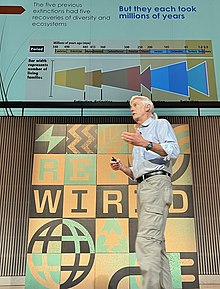
Stephen R. Palumbi (born October 17, 1956) is the Jane and Marshall Steel Jr. Professor in Marine Sciences at Stanford University at Hopkins Marine Station. He also holds a Senior Fellowship at the Stanford Woods Institute for the Environment.
Early life
Palumbi was born in Baltimore, MD. He received his BA in biology from the Johns Hopkins University in 1978 and his PhD in zoology from the University of Washington in marine ecology in 1984. He received the Buell Award from the Ecological Society of America in 1984.
Career
From 1985 to 1996, he worked in the Department of Zoology at the University of Hawaii, winning the Matsuda Fellowship Award for Faculty Research in 1991 and a University of Hawaii Regents Medal for Excellence in Research in 1996. He was promoted to full professor in 1994 and appointed the director of the Kewalo Marine Laboratory in 1995. Palumbi moved to a professorship at Harvard University in 1996 and on to Stanford University in August 2002. In 2007, he was appointed the Harold A. Miller Director of the Hopkins Marine Station, and was appointed to the Jane and Marshall Steel Chair of Biology in 2009.
In 1996, Palumbi was awarded a Pew Fellowship in Marine Conservation, which he used "to develop more rapid, cost-efficient, nonradioactive genetic test procedures to identify threatened species of cetaceans found in products taken from whale meat markets ... allow the focus of management efforts to be the individual, rather than the species or stock, and enables the tracing of particular whales from fishery to market."
In 2003, he was elected a Fellow of the California Academy of Sciences and was awarded the Peter Benchley Ocean Award for Excellence in Science in 2011.
Research interests
Palumbi's research interests include studying evolution and change using molecular genetics techniques, marine population biology and conservation, and the effects of human activity on ocean systems. Some of his well known work includes research on using genomic methods to identify species resilient to climate change, and using genetic approaches to identify species of conservation concern in wildlife markets.
Public engagement
In 2003, Palumbi participated in the documentary TV series The Future Is Wild, appearing in his capacity as Harvard University Professor of Marine Sciences in the initial episode, Welcome to the Future, as well as in four other episodes where he was also credited as a principal scientific advisor: Waterland, Flooded World, The Endless Desert, and The Global Ocean. The series explored possible evolutionary changes in the future over the period of five to two hundred million years, and was developed over a period of four years by a team of scientists whose work was visualised through computer animation.
Publications
Palumbi has written several books:
- The Evolution Explosion: How Humans Cause Rapid Evolutionary Change, 2002.
- The Death and Life of Monterey Bay: A Story of Revival, 2011 (with Carolyn Sotka).
- The Extreme Life of the Sea, 2014 (with Anthony R. Palumbi).
He has also been an author of more than 200 scientific papers.
Personal life
Palumbi is married to a physician, Mary Roberts, and is the father to two grown children. His interests include music, and was part of the group who founded the band Sustainable Sole.
References
- ^ Palumbi, Stephen R. (2013). "Curriculum Vitae" (PDF). palumbi.stanford.edu (Palumbi Lab), Hopkins Marine Station. Stanford University. Archived from the original (PDF) on March 24, 2017. Retrieved July 15, 2017.
- ^ "Stephen Palumbi". palumbi.stanford.edu (Palumbi Lab), Hopkins Marine Station. Stanford University. Archived from the original on July 16, 2017. Retrieved July 15, 2017.
- Jordan, Rob (June 28, 2017). "The radiation-exposed corals of Bikini Atoll may hold insights on cancer". Stanford Woods Institute for the Environment. Stanford University. Archived from the original on September 12, 2017. Retrieved July 15, 2017.
- ^ "Stephen Palumbi". woods.stanford.edu. Stanford University. 2017. Retrieved July 15, 2017.
- "Stephen Palumbi". hopkinsmarinestation.stanford.edu. Stanford University. Retrieved July 15, 2017.
- "Programs in Marine Conservation – Marine Fellows: Stephen R. Palumbi, Ph.D." The Pew Charitable Trusts. 2017. Retrieved July 15, 2017.
- "California Academy of Sciences – List of Fellows" (PDF). California Academy of Sciences. 2016. Retrieved July 15, 2017.
- "About the Peter Benchley Ocean Awards". peterbenchleyoceanawards.org. 2017. Retrieved July 15, 2017.
- "Peter Benchley Ocean Awards – Comprehensive List of Honorees". peterbenchleyoceanawards.org. 2017. Retrieved July 15, 2017.
- Byrne, Ciar (March 30, 2004). "Fish in trees and elephant-sized squid – the future as seen on TV". The Independent. Retrieved October 19, 2011.
- "The Future is Wild – Documentary Series". Archived from the original on June 22, 2017. Retrieved July 15, 2017.
- Palumbi, Stephen R. (2002). The Evolution Explosion: How Humans Cause Rapid Evolutionary Change. W. W. Norton & Company. ISBN 9780393323382.
- Palumbi, Stephen R.; Sotka, Carolyn (2011). The Death and Life of Monterey Bay: A Story of Revival. Island Press. ISBN 9781597269872.
- Palumbi, Stephen R.; Palumbi, Anthony R. (2014). The Extreme Life of the Sea. Princeton University Press. ISBN 9781400849932.
- "Palumbi Lab – Publications". palumbi.stanford.edu (Palumbi Lab), Hopkins Marine Station. Stanford University. June 1, 2017. Archived from the original on July 5, 2017. Retrieved July 15, 2017.